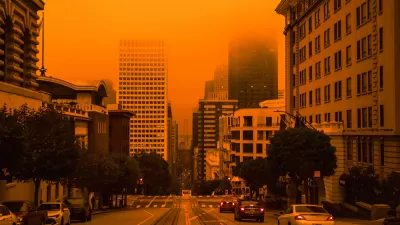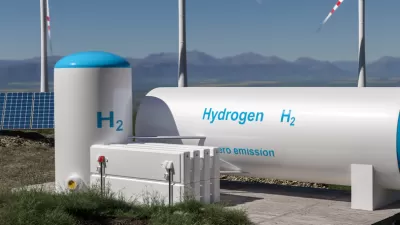Sick of reading about all the work that must be done to slow and mitigate the impact of global warming? A growing number of scientists are investigating how to "make climate change work for us."
Guy Gugliotta looks at the work of scientists studying how hotter temps and higher concentrations of carbon dioxide in the atmosphere could be a boon to plant growth, and in turn, feed a growing planet. They're focusing their research on cities, "which have conditions that can mimic what life may be like in the temperate zone of a heated planet."
“'There is a lot of emphasis on the mitigation of global warming, and we need that,' said Lewis H. Ziska, a plant physiologist for the Department of Agriculture, who is one of a growing number of scientists studying how plants react to elevated levels of greenhouse gases and other pollutants. At the same time, he added, 'we need to think about the tools we have at hand, and how we can use them to make climate change work for us.'”
"The effects of higher, mostly urban emissions are what prompted Dr. Ziska to reappraise global warming as a potential benefit to humanity. In an essay last summer in the journal Proceedings of the Royal Society B, Dr. Ziska and a group of colleagues from across the world argued that an expected increase in world population to 9 billion people from 7 billion by 2050 necessitated a “green revolution” to enhance yields of basic grains. Carbon dioxide, the group suggested, could be the answer.
“I try to avoid words like ‘good,’ ‘bad,’ ‘detrimental’ or ‘beneficial,’ ” said Kevin L. Griffin, an ecophysiologist at Columbia University who participated in a study about the 'heat island effect' on the red oak trees in New York."
FULL STORY: Looking to Cities, in Search of Global Warming’s Silver Lining

Planetizen Federal Action Tracker
A weekly monitor of how Trump’s orders and actions are impacting planners and planning in America.

Restaurant Patios Were a Pandemic Win — Why Were They so Hard to Keep?
Social distancing requirements and changes in travel patterns prompted cities to pilot new uses for street and sidewalk space. Then it got complicated.

Maui's Vacation Rental Debate Turns Ugly
Verbal attacks, misinformation campaigns and fistfights plague a high-stakes debate to convert thousands of vacation rentals into long-term housing.

In California Battle of Housing vs. Environment, Housing Just Won
A new state law significantly limits the power of CEQA, an environmental review law that served as a powerful tool for blocking new development.

Boulder Eliminates Parking Minimums Citywide
Officials estimate the cost of building a single underground parking space at up to $100,000.

Orange County, Florida Adopts Largest US “Sprawl Repair” Code
The ‘Orange Code’ seeks to rectify decades of sprawl-inducing, car-oriented development.
Urban Design for Planners 1: Software Tools
This six-course series explores essential urban design concepts using open source software and equips planners with the tools they need to participate fully in the urban design process.
Planning for Universal Design
Learn the tools for implementing Universal Design in planning regulations.
Heyer Gruel & Associates PA
JM Goldson LLC
Custer County Colorado
City of Camden Redevelopment Agency
City of Astoria
Transportation Research & Education Center (TREC) at Portland State University
Camden Redevelopment Agency
City of Claremont
Municipality of Princeton (NJ)




























